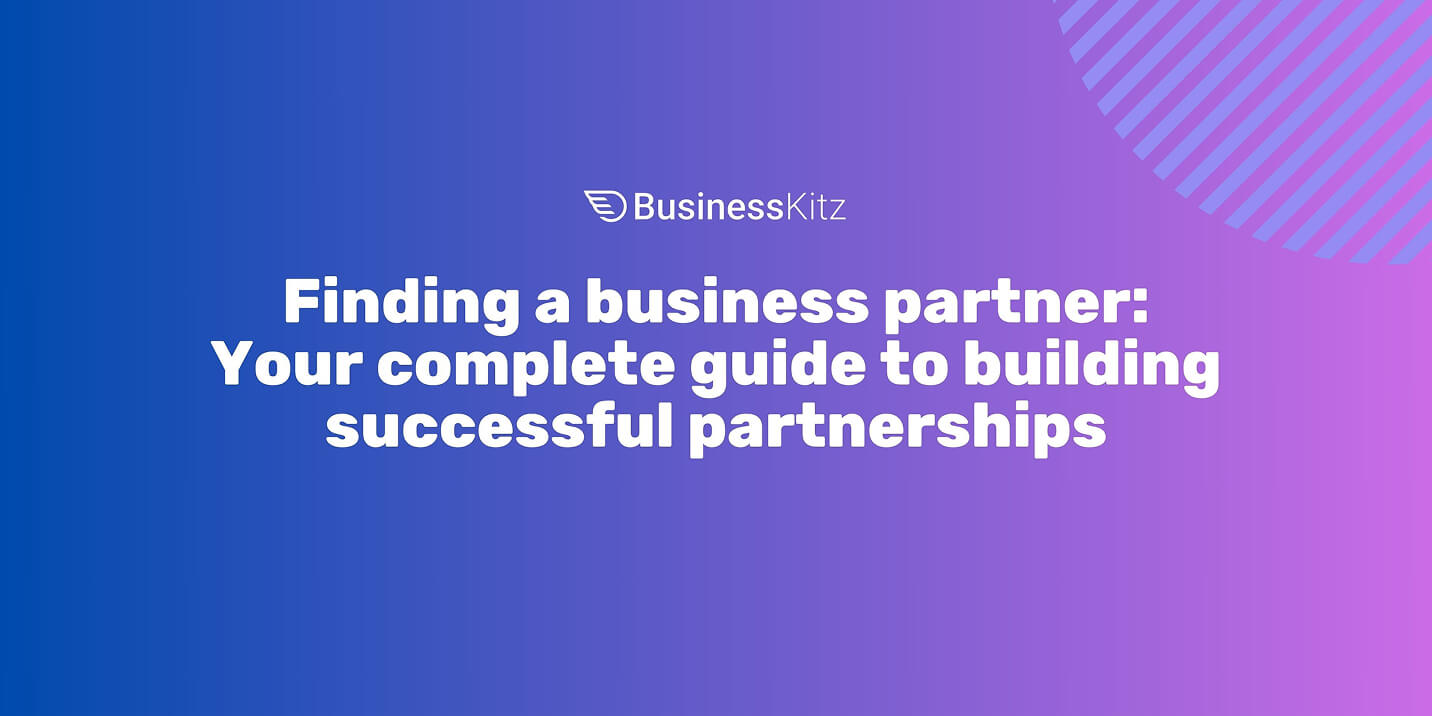
Ever wondered why some business partnerships thrive while others crash and burn within months? Finding a business partner who complements your skills and shares your vision can be the difference between building a thriving enterprise and becoming another failure statistic. With research showing that 65% of high-potential startups fail due to co-founder conflicts, choosing the right partner is one of the most critical decisions you'll make. Whether you're a solo entrepreneur ready to scale or someone with a brilliant idea needing complementary expertise, this guide will show you exactly how to find, vet, and partner with someone who'll help your business flourish.
We've helped businesses save $55m with our all-in-one platform. Get instant access to this template and 115+ others, plus AI-powered document creation, starting completely free.
The statistics are sobering but essential to understand. Exit Consulting Group estimates that up to 70% of business partnerships fail over time, with some experts suggesting the rate could be as high as 80%. Even more alarming, research indicates that 50% of partnerships fail within the first 2-3 years.
But why do so many partnerships crumble? Understanding these common pitfalls helps you avoid them:
When one partner dreams of building a global empire while the other wants a lifestyle business, conflict is inevitable. Partners must share fundamental beliefs about risk tolerance, work-life balance, and the definition of success.
Without clear boundaries, partners step on each other's toes, duplicate efforts, or leave critical tasks undone. Ego clashes become particularly damaging when there's no agreed-upon structure for decision-making.
Money troubles destroy partnerships faster than almost anything else. Unequal contributions, hidden debts, lack of transparency, and disputes over profit distribution create resentment that's hard to overcome.
Different communication styles—one partner preferring face-to-face discussions while the other avoids confrontation—lead to misunderstandings and unresolved issues that fester over time.
When partners aren't equally invested in the business's success, whether due to different financial situations or competing priorities, the imbalance breeds frustration.
The good news? Partnerships that succeed share common characteristics you can actively seek out and cultivate. Successful partners bring complementary skills rather than duplicate expertise, maintain open and honest communication, share aligned long-term goals, demonstrate equal commitment to the venture, and establish clear agreements from the start.

Finding the right business partner requires looking in the right places. While serendipitous meetings can happen anywhere, strategic searching increases your odds of finding someone truly compatible.
Your existing professional circle offers the highest-quality potential partners because you've already seen them in action. Former colleagues make excellent partners—you know their work ethic, skills, and how they handle pressure. Current coworkers might be ready for the entrepreneurial leap alongside you.
Industry contacts you've built relationships with over the years, understand your sector and bring established networks. Professional associations and chambers of commerce connect you with like-minded business people who share your ambitions.
Trade shows, conferences, and industry meetups naturally attract motivated professionals interested in growth and innovation. These venues offer opportunities to:
Target events specific to your needs—attend finance conferences if you need a numbers person, or tech meetups if you're seeking technical expertise.
The digital age has revolutionised partner discovery. Specialised platforms connect entrepreneurs worldwide:
These platforms let you filter by skills, location, industry experience, and investment capacity, making searches more efficient than traditional networking.
Business courses, entrepreneurship programmes, and industry training attract ambitious individuals ready to take the next step. MBA programmes and startup accelerators create environments where partnerships naturally form through:
Don't discount friends and family, but approach these partnerships with extra caution. While personal relationships can form successful business partnerships, they require:
Beyond finding someone willing to partner, you need someone who'll enhance your business's chances of success. Successful partnerships require specific qualities that go beyond technical skills.
The best partnerships combine different strengths. If you're a visionary creative type, partner with someone detail-oriented who loves spreadsheets. Technical founders benefit from partners with sales and marketing expertise. This diversity prevents blind spots and ensures all business aspects receive proper attention.
Look for partners who:
While skills should differ, fundamental values must align. Partners need agreement on:
Misaligned values cause more partnership failures than any other factor. Spend time discussing these topics in depth before committing.
You don't need identical communication styles, but they must be compatible. A partner who prefers written communication can work with someone who likes verbal discussions, provided both respect each other's preferences and find middle ground.
Evaluate how potential partners:
Partners must demonstrate equal dedication to the venture's success. This doesn't mean identical time commitments—one partner might work full-time while another contributes evenings and weekends initially—but the effort and dedication must feel balanced.
Warning signs include:
Money issues destroy partnerships, making financial openness crucial from the start. Potential partners should willingly discuss:
Partners hiding financial problems or expecting others to fund everything rarely contribute to successful partnerships.

Finding someone with the right qualities is just the beginning. Thorough vetting prevents costly mistakes and partnership failures down the road.
Before committing to a full partnership, test your working relationship through smaller projects. This approach reveals:
Consider consulting on a project together, organising an event, or creating a small product before formalising your partnership.
Treat partner selection like hiring a crucial employee, because that's essentially what you're doing. Your due diligence should include:
Reference checks: Speak with former colleagues, business partners, or clients. Ask specific questions about work ethic, integrity, and how they handle challenges.
Background verification: While respecting privacy, verify claimed credentials, check for legal issues, and confirm their professional history.
Financial assessment: Request credit reports if significant financial contributions are involved. Discuss any red flags openly before proceeding.
Social media audit: Review public profiles for behaviour that might reflect poorly on your business or reveal concerning patterns.
Beyond skills and credentials, partners must mesh on a human level. Spend time together outside formal business discussions to understand:
You'll spend countless hours with this person, ensure it won't be torture.
Before finalising your partnership, document clear expectations about:
These discussions might feel uncomfortable, but they prevent devastating misunderstandings later.
If something feels off despite impressive credentials or persuasive arguments, listen to your gut. Red flags, such as evasiveness about past partnerships, reluctance to put agreements in writing, or pressure to decide quickly, often signal future problems.
Better to pass on a questionable partnership than spend years untangling a bad one.

A handshake deal might seem sufficient when excitement runs high, but verbal agreements offer little protection when partnerships sour. A comprehensive written partnership agreement isn't pessimistic—it's professional protection for everyone involved.
Consider these sobering realities:
Professional partnership agreements transform vague commitments into actionable frameworks that guide your business through challenges and growth.
Legal experts recommend including these critical components:
Capital contributions and ownership: Document each partner's initial investment, whether cash, assets, or intellectual property. Specify ownership percentages and how future contributions affect these percentages.
Roles and responsibilities: Define who handles what, from daily operations to strategic planning. Clear delineation prevents overlap and ensures accountability.
Profit and loss distribution: Outline how you'll share profits and shoulder losses. While often based on ownership percentage, you can customise this to reflect different contribution types.
Decision-making procedures: Establish voting rights, which require unanimous consent versus majority vote, and how you'll resolve deadlocks.
Dispute resolution process: Include mediation or arbitration clauses to resolve conflicts without expensive litigation. Define the process before emotions run high.
Exit strategies and buyout provisions: Plan for partners leaving, retiring, or passing away. Include valuation methods and payment terms for buying out departing partners.
Non-compete and confidentiality clauses: Protect your business by limiting former partners' ability to compete directly or share proprietary information.
When partners operate across borders, additional complexities arise:
Professional legal advice becomes even more crucial for international partnerships.
Creating comprehensive partnership agreements doesn't require expensive lawyers or starting from scratch. At Business Kitz, we've developed partnership agreement templates that address all essential elements while remaining customisable for your specific needs.
Our templates help you:
Combined with our document signing features, you can finalise partnership agreements digitally—no printing, scanning, or posting required. Store signed agreements securely in your document vault for easy reference whenever needed.
Partnering with friends or family can work brilliantly; many successful businesses started this way. However, these partnerships require extra care because business conflicts can damage personal relationships. If you proceed, maintain strict professional boundaries, document everything in writing despite existing trust, and prepare for potential relationship changes. Consider whether you'd hire this person if they weren't family or friends.
While no magic number exists, research suggests two to three partners often work best. This provides diverse perspectives without creating decision-making gridlock. Solo founders face burnout and blind spots, while groups larger than four often struggle with coordination and conflicting visions. Consider your specific business needs and ensure each partner brings distinct value.
Start with informal discussions about shared interests and business ideas. If mutual interest exists, propose a specific project or consultation to test compatibility. Be transparent about your intentions and what you're seeking in a partner. Prepare a basic business concept to discuss, but remain flexible to their input. Suggest working together on a small scale before formalising any partnership.
Unequal financial contributions don't doom partnerships but require careful structuring. Consider balancing monetary investment with "sweat equity"—one partner contributing more cash while another contributes more time and expertise. Document these arrangements clearly in your partnership agreement, including how ownership percentages reflect different contribution types and any salary adjustments to balance investments.
Formalise your partnership before any significant business activities begin—ideally after successful trial collaboration, but before major investments or customer commitments. Legal experts recommend having agreements in place before creating intellectual property, signing leases, or taking on financial obligations. Early formalisation prevents disputes about ownership and responsibilities.
Modern partnership platforms use various matching methods. Most require creating detailed profiles outlining your skills, experience, and partnership goals. Algorithms suggest potential matches based on complementary factors. You can then message matches, arrange video calls, and assess compatibility before meeting in person. Premium platforms often include background verification and advisor access.
Partnerships typically operate as "pass-through" entities where profits and losses flow to individual partners' tax returns. This structure avoids double taxation but requires partners to pay taxes on their share of profits even if the money stays in the business. International partnerships face additional complexity with tax treaties and foreign income reporting. Consult tax professionals familiar with partnership structures in your jurisdiction.
Finding the right business partner transforms good ideas into thriving enterprises, but success requires more than luck—it demands strategic searching, thorough vetting, and solid legal foundations. You've learned where to find potential partners, what qualities matter most, and how proper agreements protect everyone involved. While 70% of partnerships may fail, yours doesn't have to join that statistic when you approach a partnership with eyes wide open and proper documentation in place. Ready to formalise your partnership with professional agreements that cover all the bases?
Sign up for free and access our comprehensive partnership agreement templates along with hundreds of other essential business documents.
Copyright © 2026 Business Kitz 14312161